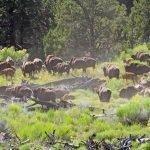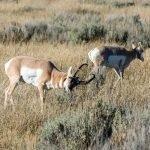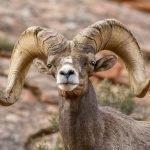Utah Wildlife News Release
Wildlife Board also approves nonresident fishing license change at Flaming Gorge
Salt Lake City — More chances to hunt bison and pronghorn will be available in Utah in 2019. New archery hunts—that should help reduce the number of deer coming into cities and towns in Utah County—will also be held.
The new hunts are among several big game hunting changes the Utah Wildlife Board approved for 2019. The board—a panel of seven citizens appointed by the governor—approved the changes at a Nov. 29 meeting in Salt Lake City.
All of the rules the board approved will be available in the 2019 Utah Big Game Application Guidebook. The free guidebook should be available at www.wildlife.utah.gov/guidebooks by the end of December.
Board members also passed several other changes at the meeting, including a fishing change that will affect nonresidents who want to fish both the Utah and Wyoming sides of Flaming Gorge Reservoir.
More chances to hunt
Big game animals are doing well in Utah. And, in certain pockets of the state, they’re doing extremely well. To help manage the populations, and give hunters more chances to hunt, members of the board approved several new hunts for 2019. Here’s a sample:
· New bison hunts on the Henry Mountains in southeastern Utah and the Book Cliffs in eastern Utah
· New muzzleloader and archery pronghorn hunts in northeastern Utah
· A Rocky Mountain bighorn sheep hunt on the Oquirrh-Stansbury unit in north-central Utah. The hunt will be the first bighorn hunt held on the unit since 2015.
· For the first time ever, once-in-a-lifetime archery bighorn sheep hunts. An archery hunt for Rocky Mountain bighorn sheep will be held on the Newfoundland Mountains unit in northern Utah. Another archery hunt, this one for desert bighorns, will be held on the Zion unit in southwestern Utah.
Controlling deer in cities and towns
Deer are thriving along the Wasatch Front. And the number of people along the front is growing. In some cases, more deer and more people mean more conflicts between the two.
To try to reduce the number of deer that are making their way into cities and towns in Salt Lake and Utah counties, members of the Wildlife Board approved some new extended archery hunts. (The season dates for extended archery hunts are longer than most hunts. For example, on most of the extended archery areas, you can hunt deer from Sept. 14 – Nov. 30, 2019. You can take one buck deer or one doe deer. A total of nine extended archery deer hunts will be offered in Utah in 2019.)
“The extended archery hunts have worked,” says Covy Jones, big game coordinator for the Division of Wildlife Resources. “They’ve helped reduce the number of deer that make their way into cities and towns. They’re a great management tool.”
Members of the board approved four extended archery hunt changes along the west slope of the Wasatch Mountains. Three of those changes are in Utah County:
· A new extended archery hunt will be held in the mountains near Herriman in Salt Lake County.
· A new extended archery hunt will be held in areas around Utah Lake in Utah County.
· The boundary of the Wasatch Front extended archery area has been extended to American Fork Canyon in Utah County. The boundary now runs from the Weber/Davis County line all the way to American Fork Canyon.
· A new South Wasatch extended archery area has been established. The boundary for the area extends from American Fork Canyon south to Hobble Creek Canyon.
“Extending the Wasatch Front boundary to American Fork Canyon,” Jones says, “and creating two new extended archery areas in Utah County should help reduce the number of deer that are coming into urban areas in the county.”
Flaming Gorge Reservoir
In addition to the big game hunting rules, members of the board also approved a fishing change at Flaming Gorge Reservoir. Starting Jan. 1, 2019, those who are not residents of Utah or Wyoming—but want to fish both the Utah and Wyoming sides of Flaming Gorge Reservoir—must buy a nonresident fishing license from both states.
In the past, those who were not residents of either state could buy a nonresident license from one state and a reciprocal fishing permit from the other state. “We met with officials from Wyoming Game & Fish Department and came to consensus on the change,” says Craig Walker, assistant Aquatic Section chief for the DWR. “Passage by the Wildlife Board makes it official.”
- New bison hunts will be held on the Henry Mountains and the Book Cliffs next fall.
- New muzzleloader and archery pronghorn hunts will be held in northeastern Utah in 2019.




